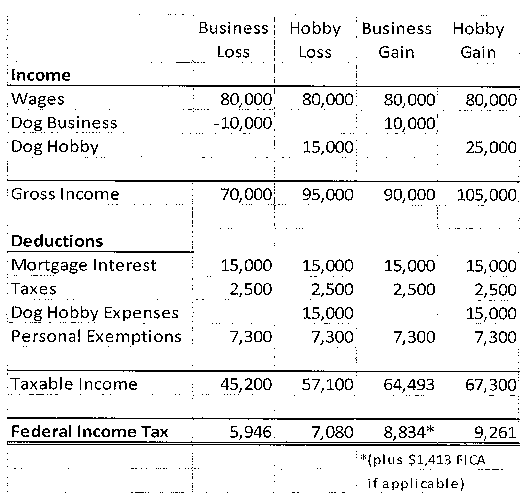Labradoodleductions
Labradoodleductions
Audit Issues
Audit Issues
Print Full ArticleLast Reviewed: Feb 2011
Last Modified: Feb 2011
If your breeding operation is profitable, your risk of audit is quite low (depending on what else is on your tax return, of course) and will likely focus on substantiating business income and expenses with receipts and other records. If your operation generates a loss, however, your audit risk is higher and will probably begin by determining whether or not a profit motive exists before moving on to the substantiation phase. Profit motive is a key issue and not always easily determined or substantiated. Let's take a closer look at the issue and how you can avoid the pitfalls.
All income is taxable unless specifically exempt by law. Expenses, however, are the reverse - they are generally not deductible unless allowed by law. Even when allowed, expenses are often subject to restrictions and limitations. For example, expenses related to a hobby are limited to the income generated by the hobby. In other words, a hobby is not allowed to generate a loss on your tax return. Business expenses, on the other hand, are not limited to the income generated - a business loss can be used to offset income from other sources such as wages or investment income. Determining the difference between a business and a hobby, therefore, is often of crucial importance. The tax code defines the difference this way: A business is an activity in which a profit motive exists and a hobby is anything else. So you do not have to be profitable to be considered a business, but you do have to try to be profitable.
Nine factors are used to determine whether a profit motive exists:
- The manner in which you carry on the activity - Do you act like a business?
- Your level of expertise - If you are not knowledgeable, are you at least getting the advice of consultants who are?
- Time and effort - How hard are you really working at this?
- Expectation of asset appreciation - Are you buying or generating assets which can be reasonably expected to become more valuable over time (real estate, etc)?
- Success in other business activities - Have you proven yourself before?
- History of your income or loss in the activity - How many good years, how many bad?
- Amount of occasional profits - Does one good year make up for many bad years?
- Your financial status - How dependent are you on the success of the activity?
- Elements of personal pleasure - Is this just a way to deduct something you enjoy doing?
No single element is conclusive; all must be weighed together and taken as a whole. It is not uncommon for a business to sustain a loss for the first year or two of operations, but with each loss year it becomes more important to be able to prove the profit motive. And because Labradoodles are so darn enjoyable to be around, the "elements of personal pleasure" test takes on particular relevance here and should not be underestimated. You will want to distinguish your breeding operation from the many the IRS sees where there is no real expectation or intent of ever turning a profit.
Good ways to substantiate profit motive include building and maintaining a quality website, generating and updating a business plan (make sure it is realistic and shows a profit!), keeping a business journal of time spent, and working hard to increase revenue and decrease expenses. Almost sounds like work, right? Well guess what - that's the idea!
To see the tax impact of the business vs. hobby discussion, consider a hypothetical scenario of a married couple with $80,000 of combined wages and a dog breeding operation. To see the effect in a loss year, assume $15,000 of dog sales and $25,000 of dog expenses (including depreciation). In a profitable year, assume $25,000 of sales and $15,000 of expenses. As you can see, the hobby operation generates more income tax in both scenarios. Note, however, that in many cases a business profit is also subject to Self-Employment tax (FICA), so plan carefully.

The question of whether your dog breeding operation is a business or a hobby is likely the single most important one you will face if you are audited. That and the $10,000 tax credit you claimed for kickbacks paid to foreign officials for your drug smuggling operation.
